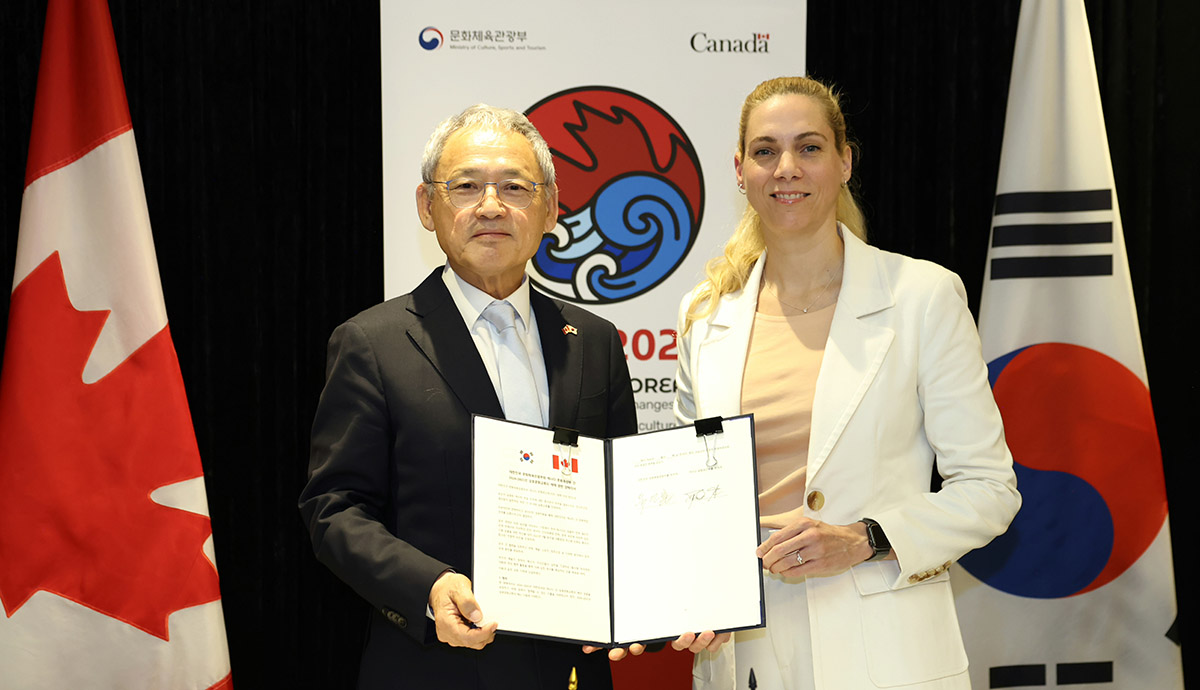
Korea and Canada Launch a Year of Cultural Exchanges
On June 25, Canada signed an agreement with the Republic of Korea declaring 2024-2025 the Korea-Canada Year of Cultural Exchanges – a fitting follow-up to the 2023 milestone of 60 years of shared relations between the two democratic countries.
The agreement comes at a time when South Korean pop culture’s renown in the English-speaking world is considerable. The Oscar Award-winning movie Parasite (2019) introduced North Americans to the 100-year-old film industry in Korea, but the country is also well-known for television series like the critically acclaimed Squid Game. Then there is the music industry: K-pop music and K-dance, which broke out in 2012 with Psy’s Gangnam Style, continue to gain in popularity.
Ottawa Life Magazine had the privilege of interviewing Korea’s Minister of Culture, Sports, and Tourism, Yu In-Chon before the official launch. The conversation delved into the significance of the upcoming year of cultural exchange, the shared experiences that bind Canada and Korea, and how celebrating each other’s culture will deepen our ties and foster a stronger connection between our two nations.
Minister Yu began by providing some background on Canada-Korean relations. He noted that although Canada and Korea have a shared history dating back to the Korean War, with Canada contributing the third-largest contingent of troops after the United Kingdom and the United States to support liberal democracy, cultural exchanges between the two countries have not been as robust as their economic ties.
That’s why, he explained, the Year of Cultural Exchanges will be so impactful. “Firstly, it will enhance mutual cultural understanding between the citizens of both nations. Secondly, it will stimulate and strengthen cultural exchanges. Thirdly, it will create collaborative growth and development opportunities for both countries.”
When asked what is behind the surge of Korean culture in the West over the past decade, particularly its success in film, literature and music, Minister Yu said that Korean stories explore themes people everywhere can appreciate, with a unique twist: “Korean cultural content tells universal stories that resonate globally while also expressing the originality of the Korean people.”
Another reason for this breakthrough into the cultural zeitgeist is that Korea is a global leader in technology — think Samsung, LG and SK Hynix. Minister Yu acknowledged that Korea has an advantage in both creating and disseminating its home-grown productions “thanks to cutting-edge information technology.”
The Minister further pointed out that this trend has led to significant growth globally, with the Republic of Korea being the seventh most culturally influential country in the world, according to a U.S. News &World Report. Another survey by Korean Foundation found that there were over 225 million Koreaphiles around the globe in 2023, which is incredible given that the country has a population of roughly 52 million people.
As of 2022, Korea’s exported cultural content was worth USD 13.24 billion, which was more significant than the country’s major export products, including rechargeable batteries ($9.99B), electric vehicles ($9.83B), and home appliances ($8.06B).
The Korea-Canada Year of Cultural Exchange was kicked off by a special performance at the NAC on June 25 with the visiting National Orchestra of Korea and Canadian artists. Over the next year, Korean culture will be highlighted at Canadian events including the Ottawa Animation Festival, considered one of the three premier animation events globally, and the Salon du Livre in Montreal, which will showcase Korean literary works.
Minister Yu is also looking forward to sharing Canadian culture with audiences in his homeland. For example, he said, “In 2025, a prominent Canadian performing arts institution will visit Korea to present a high-quality performance, further enriching the cultural exchanges.” He added that one aspect of Canadian culture he finds intriguing is our multiculturalism.
“American culture is compared to a melting pot while Canadian culture is close to a mosaic,” said the Minister. “Put differently, Canada preserves different cultures as they are while ensuring harmony. Korea can learn from this and make such policy-related efforts.”
This year promises to be rich in its offering for Koreaphiles in Canada and for Koreans who are curious about our country’s culture. The ceremony to mark the agreement of the beginning of the Canada-Korea Year of Cultural Exchange took place on Tuesday, June 25, with the National Orchestra of Korea performing to mark the occasion.
To learn more about this rich cultural moment for both our countries or to find out about upcoming Korean events in Ottawa, please visit the website of the Korean Cultural Centre in Canada: canada.korean-culture.org/EN
HEADER IMAGE: Korea’s Minister of Culture, Sports, and Tourism, Yu In-Chon with Canadian Heritage Minister Pascale St-Onge.









